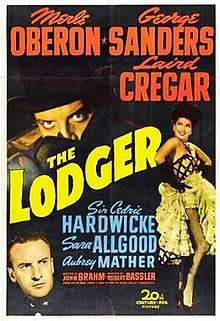The Lodger (1944 film)
The Lodger is a 1944 horror film about Jack the Ripper, based on the novel of the same name by Marie Belloc Lowndes. It stars Merle Oberon, George Sanders, and Laird Cregar, features Sir Cedric Hardwicke, and was directed by John Brahm from a screenplay by Barré Lyndon.
| The Lodger | |
|---|---|
 Theatrical release poster | |
| Directed by | John Brahm |
| Produced by | Robert Bassler |
| Screenplay by | Barré Lyndon |
| Based on | the novel The Lodger by Marie Belloc Lowndes |
| Starring | |
| Music by | Hugo Friedhofer |
| Cinematography | Lucien Ballard |
| Edited by | J. Watson Webb Jr. |
| Distributed by | 20th Century Fox |
Release date |
|
Running time | 84 minutes |
| Country | United States |
| Language | English |
| Budget | $869,300[1][2] |
| Box office | $2 million[3] $2,295,500 (worldwide)[1] |
Lowndes' story had previously been filmed in 1927 as a silent film, The Lodger: A Story of the London Fog, directed by Alfred Hitchcock, and with sound in 1932 as The Lodger. It was remade again in 1953 as Man in the Attic, starring Jack Palance, and again in 2009 by David Ondaatje.
Plot
Slade, a serial killer, is a lodger in a 19th-century family's London home. So is a singer, Kitty Langley, who definitely has caught Slade's eye.
Women are being brutally killed in the Whitechapel district. Scotland Yard is investigating, and a detective, John Warwick, begins to cast his suspicions in Slade's direction. Kitty, meanwhile, has also developed an attraction to Slade.
Slade goes to see her perform at a cabaret. He goes backstage afterward, and tries to make her his next victim, but Warwick's men get there just in time. Unwilling to be taken into police custody, Slade flees to the riverbank, and leaps to his death.
Cast
- Merle Oberon as Kitty Langley (singing voice was dubbed by Lorraine Elliott)
- Laird Cregar as Mr. Slade, the lodger
- George Sanders as Inspector John Warwick
- Sir Cedric Hardwicke as Robert Bonting
- Sara Allgood as Ellen Bonting
- Aubrey Mather as Superintendent Sutherland
- Queenie Leonard as Daisy, the maid
- Doris Lloyd as Jennie
- David Clyde as Sergeant Bates
- Helena Pickard as Annie Rowley
- Ted Billings as News Vendor (uncredited)
- Cyril Delevanti as Stagehand (uncredited)
- Stuart Holmes as King Edward (uncredited)
- Olaf Hytten as Harris (uncredited)
Reception
Box office
The film made a profit of $657,700.[1]
Critical
The New York Times gave the film a positive review: "If The Lodger was designed to chill the spine—as indeed it must have been, considering all the mayhem Mr. Cregar is called upon to commit as the mysterious, psychopathic pathologist of the title—then something is wrong with the picture. But, if it was intended as a sly travesty on the melodramatic technique of ponderously piling suspicion upon suspicion (and wrapping the whole in a cloak of brooding photographic effects), then The Lodger is eminently successful."[4] Variety wrote: "With a pat cast, keen direction, and tight scripting, 20th-Fox has an absorbing and, at times, spine-tingling drama".[5] TV Guide rated it 4/5 stars, and wrote: "Cregar is absolutely chilling in this Jack the Ripper tale, perhaps the best film made about Bloody Jack."[6]
See also
References
- Mank, Gregory William (2018). Laird Cregar: A Hollywood Tragedy. McFarland.
- FRED STANLEY (Oct 17, 1943). "ALL IS CONFUSION: Hollywood Views Juvenile Delinquency Films Through Haze of Censorship". New York Times. p. X3.
- Aubrey Solomon, Twentieth Century-Fox: A Corporate and Financial History Rowman & Littlefield, 2002 p 220
- The New York Times, film review, January 20, 1944. Accessed: July 4, 2013.
- "Review: 'The Lodger'". Variety. 1944. Retrieved February 20, 2015.
- "The Lodger". TV Guide. Retrieved February 20, 2015.
External links
- The Lodger on IMDb
- The Lodger at AllMovie
- The Lodger at the TCM Movie Database
- The Lodger film trailer on YouTube